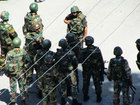Spotlight
Tunisia's new President Moncef Marzouki said in an interview aired on Friday he was against foreign intervention in Syria, where thousands have been killed in months of anti-regime protests.
"Of course I am opposed to foreign intervention in Syria," he told France 24 in his first comments on the crisis in Syria since taking office Tuesday, after the first elections since the Arab Spring was unleashed in his country.
 Full Story
Full Story
Syrian Vice President Farouq al-Sharaa is to hold talks with Russian officials in Moscow in a bid to defuse the crisis in his country, Russian news agencies quoted a Kremlin source as saying Friday.
"He is to be received in Moscow for a serious conversation," said the source, who was not identified. "This is our contribution to a solution to the crisis, which of course is worrying us."
 Full Story
Full Story
Kuwaiti riot police used tear gas and water cannons on Friday to disperse hundreds of stateless protesters who were demanding citizenship and other basic rights.
The police attacked some 400 people who gathered following noon prayers in Jahra, 50 kilometers northwest of Kuwait City, raising Kuwaiti flags and banners reading: "We demand Kuwaiti citizenship."
 Full Story
Full Story
Hundreds of thousands of Syrians protested nine months into their uprising on Friday, demanding the Arab League hasten its response to a bloody crackdown on dissent, as activists said security forces shot dead 17 people across the country.
Nine people were killed in the central province of Homs, three in the central province of Hama, three in the southern province of Daraa and two near the capital Damascus, the Local Coordination Committees reported.
 Full Story
Full Story
Bahraini police have arrested prominent human rights blogger Zainab al-Khawaja, according to a rights group and video posted online of her being roughed up, handcuffed and dragged off into custody.
Khawaja had been taking part in a sit-in protest on a highway leading to the capital Manama when police moved in to detain her on Thursday, the Bahrain Centre for Human Rights said in a statement.
 Full Story
Full Story
At least two people were killed on Friday and more than 170 hurt in clashes between Egyptian protesters and security forces, a health ministry official said, as the worst violence in weeks overshadowed the count in the second phase of a landmark general election.
"Two people died of gunshot wounds and 138 were wounded," said the official on condition of anonymity because he was not authorized to speak to media.
 Full Story
Full Story
The U.S. military signed over to Baghdad the last of its military bases in Iraq at a ceremony near the southern city of Nasiriyah on Friday, an Agence France Presse journalist said.
The Imam Ali Base, referred to by the U.S. military as Camp Adder, lies southwest of Nasiriyah, and was officially handed over to Hussein al-Assadi, the Iraqi official responsible for base transfers.
 Full Story
Full Story
U.S. Secretary of State Hillary Clinton said Thursday the United States hopes it can work with Russia on the draft resolution it proposed to the U.N. Security Council on the Syria crisis.
Though Clinton said Washington had differences with Moscow on the draft, Clinton said it was the "first time" that Russia has recognized the violence in Syria needs to be taken up by the Security Council.
 Full Story
Full Story
Russia on Thursday surprised the Western powers by proposing a U.N. Security Council resolution on the Syrian crisis, as France hailed the move as "an extraordinary event."
As a key ally of President Bashar al-Assad, Russia has tried to head off Security Council intervention in the Syria crisis. With China, it vetoed a council resolution proposed by European nations in October condemning Assad's crackdown on protests which the U.N. says has left 5,000 dead.
 Full Story
Full Story
A leading Syrian human rights activist on Thursday urged the international community to cut diplomatic ties with Damascus and up pressure on Russia to stop blocking U.N. action against the regime there.
"So far 5,000 people have been killed in Syria, among them are 277 children, 159 women and a lot of people were killed under torture. All this is happening in cold blood and the international community is watching and doing nothing," Rami Abdul Rahman, founder of the Britain-based Syrian Observatory for Human Rights said Thursday on the sidelines of a European Union conference in Warsaw.
 Full Story
Full Story




